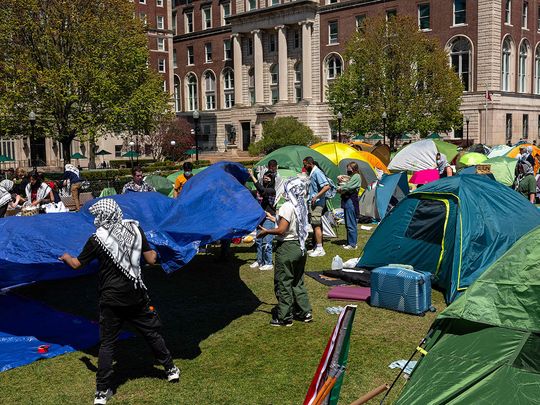
Israel is losing America’s Generation Z, those born between 1997 and 2012, as well as many of the millennials, and the battleground is leading university campuses.
The war on Gaza, having passed the 200-day mark recently, has shifted public opinion in the United States and most of the Western countries in an unprecedented way. The loss of Israel’s image is beyond imagination.
Last week, the tempo of pro-Palestine protests in US campuses reached a new high, ushering in a new era of student activism that has been missing for decades. The protests have become a gadfly for pro-Israel politicians, the Biden administration, and the Israeli government.
The students are calling for an immediate ceasefire in Gaza, halting arms shipments to Israel, university divestment from companies profiting from the war, as well as an amnesty for students and faculty members who have been disciplined or fired for protesting.
One such battleground is the prestigious Columbia University, where the president, Egyptian-born Minouche Shafik, has clamped down on the protesters and called on the police to enter the campus grounds and make arrests. She had come under pressure from Congress to stop pro-Palestine protests or resign.
Similar protests have erupted at Yale University, New York University, Emerson College, and MIT. In some cases, classes were suspended, and tens of students were taken into custody.
Debunking claim of anti-Semitism
Pro-Israel politicians and influential university donors have claimed that the protests were anti-Semitic. They also claimed that Jewish students attending these universities and colleges were being intimidated. Organisers of the protests insist that they are peaceful and anti-war.
Ironically, one of the main organisers of the protests is the Jewish Voice for Peace, debunking the claim of anti-Semitism. Those joining the protests are young activists from different faiths and political orientations.
One prominent American Jewish lawyer, Stanley Cohen, has come out to defend suspending students and said he plans to sue “fascist” Columbia University. He threatened to bring the case to the US Supreme Court.
The organisers responded to claims about harassing and intimidating Jewish students, saying that they disavowed violence against pro-Israel counter-protesters.
Students have set up camps on university grounds and held musical festivals celebrating their newfound cause of solidarity with the Palestinians while condemning their government’s blind support of Israel. They also denounced US politicians’ fealty to Israeli lobbies such as AIPAC.
The protests have received wide media attention, as the issue has transcended support of the Palestinians to others, such as freedom of speech and political bias that violates the most basic of America’s principles.
Commentators made contrasts between the anti-Vietnam War activism by baby boomers in universities across the US in the late 1960s and Generation Z’s newfound Gaza anti-war sentiments. The 1960s protests were fuelled by media coverage by US war correspondents of the horrors of the Vietnam War.
The publication of the Pentagon Papers, an outline of the war in Indochina from 1945 to 1968, by The New York Times in 1971, gave an additional boost to the anti-war movement in US campuses, which put pressure on President Richard Nixon to seek an end to that war.
This time, the US mainstream media lost much of its credibility as it adopted the Israeli narrative and ignored reports of horrific atrocities committed against the Palestinians in Gaza. But Generation Z had access to live reports from Gaza provided by Palestinian journalists and citizens through social media.
The protests began late last year, forcing Congress to interrogate three leading university presidents over allowing pro-Palestine demonstrations to go on. Back then, the University of Pennsylvania’s president was forced to resign after coming under fire for her response to alleged anti-Semitism on campus.
Israel and its lobbies
The backlash against anti-Israel protests on US campuses underlines the fact that Israel and its lobbies continue to have an enormous sway over American politics. Republican lawmakers have called Biden to send in the National Guards to quell the protests.
Israel’s war on Gaza and reports of mass killings, man-made famine, and indiscriminate bombing of civilian infrastructure have damaged President Biden’s bid for a second term, especially as he is losing the votes of Democratic progressives, Muslim and Arab Americans.
The spirit of the 1960s anti-war movement is now being felt across US campuses. The danger to Israel is that the sons and daughters of influential Americans attend most of these Ivy League and leading US universities. Many of the protesters represent the future generation of US politicians and CEOs.
The divestment condition is also scary. At the height of the anti-apartheid movement against white rule in South Africa, wealthy American universities were forced to divest from companies doing business with Pretoria. The effect of the move led to an international wave of boycotts that finally brought the apartheid regime to its knees.
On Wednesday, Israeli Prime Minister Benjamin Netanyahu lambasted anti-Israel, pro-Palestinian protests on university campuses across the United States.
His attempt to blemish the protests is not likely to work. He fails to realise that these students have embraced a cause that is now larger than Gaza. It is about their right to express and defend the ideals and values of their nation.
Osama Al Sharif is a journalist and political commentator based in Amman.









